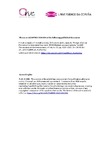Design of Linear Precoders for Correlated Sources in MIMO Multiple Access Channels

Use este enlace para citar
http://hdl.handle.net/2183/34552Coleccións
- GI-GTEC - Artigos [186]
Metadatos
Mostrar o rexistro completo do ítemTítulo
Design of Linear Precoders for Correlated Sources in MIMO Multiple Access ChannelsData
2018-12Cita bibliográfica
P. Suárez-Casal, J. P. González-Coma, Ó. Fresnedo and L. Castedo, "Design of Linear Precoders for Correlated Sources in MIMO Multiple Access Channels," in IEEE Transactions on Communications, vol. 66, no. 12, pp. 6110-6122, Dec. 2018, doi: 10.1109/TCOMM.2018.2863362.
É version de
https://doi.org/10.1109/TCOMM.2018.2863362.
Resumo
[Abstract]: This paper focuses on distributed linear precoding when users transmit correlated information over a fading multiple-input and multiple-output multiple access channel. The precoders are optimized in order to minimize the sum-mean square error (MSE) between the source and the estimated symbols. When sources are correlated, minimizing the sum-MSE results in a non-convex optimization problem. The precoders for an arbitrary number of users and transmit and receive antennas are thus obtained via a projected steepest-descent algorithm and a low-complexity heuristic approach. For the more restrictive case of two single-antenna users, a closed-form expression for the minimum sum-MSE precoders is derived. Moreover, for the scenario with a single receive antenna and any number of users, a solution is obtained by means of a semi-definite relaxation. Finally, we also consider precoding schemes where the precoders are decomposed into complex scalars and unit norm vectors. Simulation results show a significant improvement when source correlation is exploited at precoding, especially for low signal-to-noise ratios and when the number of receive antennas is lower than the number of transmitting nodes.
Palabras chave
Correlation
Multiuser channel
Linear approximation
Optimization methods
Transmitters
Multiuser channel
Linear approximation
Optimization methods
Transmitters
Descrición
© 2018 IEEE. This version of the article has been accepted for publication, after peer review. Personal use of this material is permitted. Permission from IEEE must be obtained for all other uses, in any current or future media, including reprinting/republishing this material for advertising or promotional purposes, creating new collective works, for resale or redistribution to servers or lists, or reuse of any copyrighted component of this work in other works. The Version of Record is available online at: https://doi.org/10.1109/TCOMM.2018.2863362
Versión do editor
Dereitos
©2018 IEEE Todos os dereitos reservados. All rights reserved.
ISSN
0090-6778





